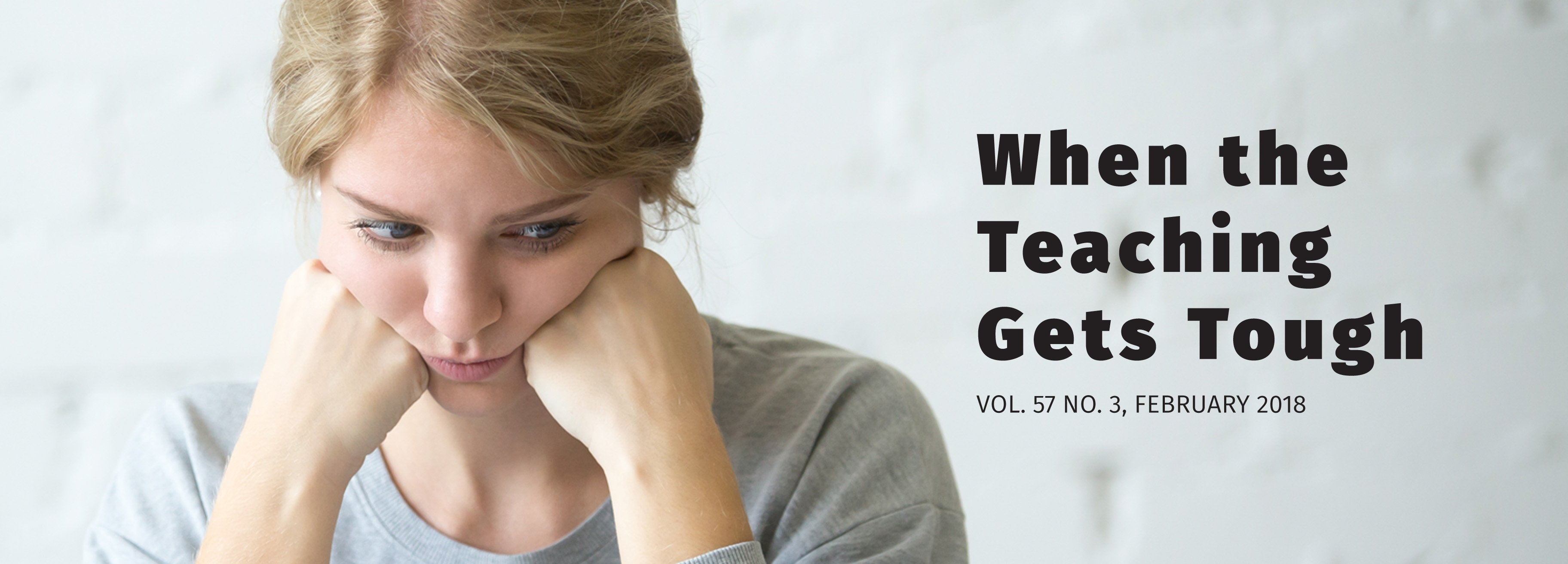In preparation for this issue’s P@nel.Edu column, Christian Altena, Justin Cook, Rebecca DeSmith, and I (John Walcott) sat down together via video conference to discuss our thoughts about “when teaching gets tough.” I began by asking the panelists to give specific examples of difficult teaching situations and how they handled them.
What I did not know as we met together is that one of our group, Rebecca, along with her school, is in the middle of a situation that certainly fits the theme “when the teaching gets tough,” but that also goes much deeper than a bad day in the classroom or office. As our conversation continued, we were not sure where it might lead or whether we would end up sharing it with the CEJ readers.
Ultimately, however, we decided that this conversation should be shared. Our desire is that by sharing with our readers not only some specific examples and responses but also a glimpse at what it means to be in community, to share our joys and sorrows, to pursue right relationships, and to think deeply about how complex and tragic situations affect our lives, schools, and communities, we can grow in our understanding of who we are as educators and of the places God has called us to.
In response to my introduction, Rebecca initiated our conversation.
Rebecca: To begin, I just have to get this out there because Sioux Center Christian School has been dealing with a very difficult situation in the past few months. I know this is a sensitive issue, but I do want to share it with you.
The topic of this discussion is “When the Teaching Gets Tough,” and the teaching has been really tough at our school in the last couple of months. Maybe you’ve heard about it. We had a fifth-grade teacher at our school, one of those teachers whom students loved; he was the athletic director and a coach. About the middle of October, it was discovered that he had been abusing young boys in grades 5–8 for several years. We have documentation in the last four years of 146 accounts of abuse to boys in 5th through 8th grade. This was devastating to our school. He was fired immediately with the first allegation, but since the first student came forward, we’ve had additional students talk to abuse reporters and police officers about his inappropriate behavior.
This has devastated students, parents, teachers, and our whole school community. There are former students in high school who were abused by him who are trying to figure out how to deal with that abuse. The ripple effects are countless in our community right now. There has been a lot of publicity, as you can imagine.
Christian: From Chicago Christian, we offer you our sincerest prayers because we have gone through this as well. These kinds of tragedies cast a pall over the entire school that can last for a long time. So, our earnest prayers going your way as well.
Rebecca: Thank you.
Justin: Rebecca, we are heartbroken for you as well. And I would just add, I think it’s a Solzhenitsyn quote, that the line of good and evil runs through every human heart, so our dealing with suffering is constantly an internal and an external issue, and we certainly experience that deeply just like you are now.
John: Thank you for sharing that, Rebecca. You’ve shared a very real situation that not only makes teaching incredibly tough but that also tears at individuals and members of a community. It is incredibly difficult to even come to school in times like this, facing students and families, facing colleagues and just wondering what to say and how to react to it. This most certainly finds its way into our classrooms and schools. I can imagine that many, many conversations that go on in the school day have that as the backdrop for a long period of time. It is hard to feel normal.
So, how do we respond when we or our school is confronted by an issue that is public, is horrible, and has rippling effects beyond just a bad day? Are there things that your schools do or that you do as teachers that are positive responses or attempts at positive responses?
Christian: What we did at Chicago Christian was to very immediately meet as a whole community; we had a number of chapels and prayer times.
Rebecca: Our school has implemented some of the same procedures. We were also given statements to read to students so that they would all get the same information. We had counselors come in for students, for teachers, for parents; professional counselors have visited on multiple occasions. One hard thing is that many of the students who were abused over the years didn’t realize that what was going on was wrong, so they never told parents. So parents as well as teachers are feeling a great amount of guilt and anger, and that’s still coming out.
John: Let’s shift the conversation to more general advice. We all have stories of different things that challenge us in our teaching. So how do we respond in these situations? What is the mindset that we need to be able to develop to get through these tough times? Can we in some way prepare for the inevitable obstacles, bad days, and even tragic situations that we might face?
Christian Altena, who teaches at Chicago Christian High School in Palos Heights, Illinois.
Justin Cook, who serves as the director of learning at the Ontario Alliance of Christian Schools in Ancaster, Ontario.
Rebecca DeSmith, who serves as Discovery Program coordinator and teacher at Sioux Center Christian School.
John Walcott, who is assistant professor in the education department at Calvin College.
